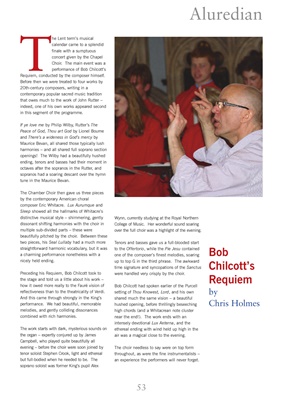
Aluredian
53
Bob
Chilcott's
Requiem
by
Chris Holmes
T
he Lent term's musical
calendar came to a splendid
finale with a sumptuous
concert given by the Chapel
Choir. The main event was a
performance of Bob Chilcott's
Requiem, conducted by the composer himself.
Before then we were treated to four works by
20th-century composers, writing in a
contemporary popular sacred music tradition
that owes much to the work of John Rutter -
indeed, one of his own works appeared second
in this segment of the programme.
If ye love me by Philip Wilby, Rutter's The
Peace of God, Thou art God by Lionel Bourne
and There's a wideness in God's mercy by
Maurice Bevan, all shared those typically lush
harmonies - and all shared full soprano section
openings! The Wilby had a beautifully hushed
ending, tenors and basses had their moment in
octaves after the sopranos in the Rutter, and
sopranos had a soaring descant over the hymn
tune in the Maurice Bevan.
The Chamber Choir then gave us three pieces
by the contemporary American choral
composer Eric Whitacre. Lux Aurumque and
Sleep showed all the hallmarks of Whitacre's
distinctive musical style - shimmering, gently
dissonant shifting harmonies with the choir in
multiple sub-divided parts - these were
beautifully pitched by the choir. Between these
two pieces, his Seal Lullaby had a much more
straightforward harmonic vocabulary, but it was
a charming performance nonetheless with a
nicely held ending.
Preceding his Requiem, Bob Chilcott took to
the stage and told us a little about his work -
how it owed more really to the Fauré vision of
reflectiveness than to the theatricality of Verdi.
And this came through strongly in the King's
performance. We had beautiful, memorable
melodies, and gently colliding dissonances
combined with rich harmonies.
The work starts with dark, mysterious sounds on
the organ - expertly conjured up by James
Campbell, who played quite beautifully all
evening - before the choir were soon joined by
tenor soloist Stephen Crook, light and ethereal
but full-bodied when he needed to be. The
soprano soloist was former King's pupil Alex
Wynn, currently studying at the Royal Northern
College of Music. Her wonderful sound soaring
over the full choir was a highlight of the evening.
Tenors and basses gave us a full-blooded start
to the Offertorio, while the Pie Jesu contained
one of the composer's finest melodies, soaring
up to top G in the third phrase. The awkward
time signature and syncopations of the Sanctus
were handled very crisply by the choir.
Bob Chilcott had spoken earlier of the Purcell
setting of Thou Knowest, Lord, and his own
shared much the same vision - a beautiful
hushed opening, before thrillingly beseeching
high chords (and a Whitacrean note cluster
near the end!). The work ends with an
intensely devotional Lux Aeterna, and the
ethereal ending with wind held up high in the
air was a magical close to the evening.
The choir needless to say were on top form
throughout, as were the fine instrumentalists -
an experience the performers will never forget.